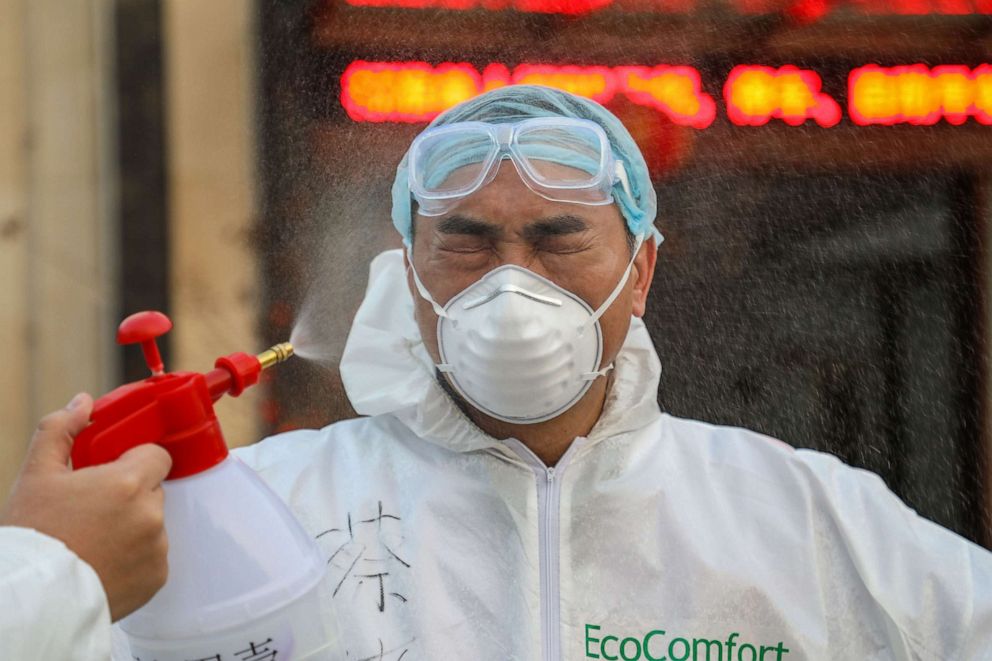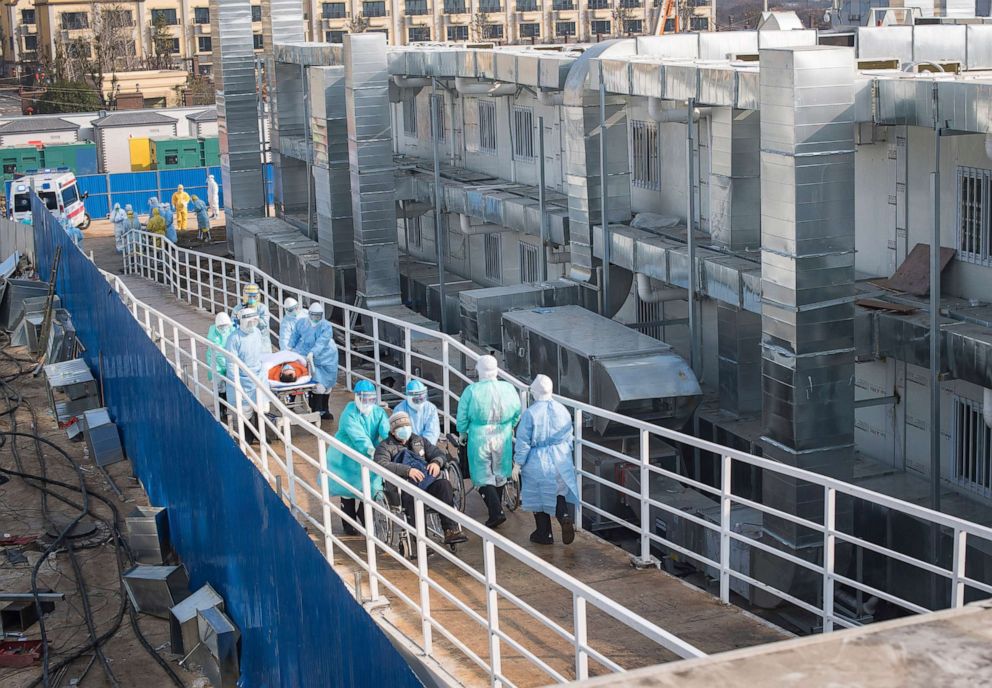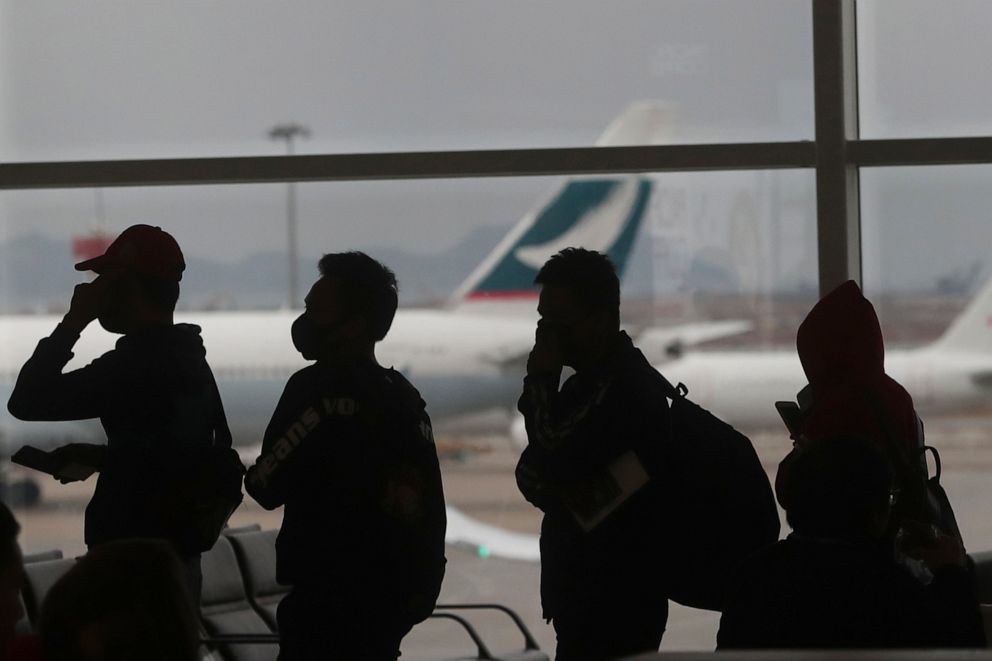American man anxiously awaits family to return from Wuhan, China, amid coronavirus outbreak
"We're just trying to reunite our family."
Wisconsin resident Samuel Roth has been on edge for the past two weeks.
His wife and children have been stranded in Wuhan, China, the epicenter of a newly discovered coronavirus.
The Chinese government imposed a lockdown on the city and others in central Hubei province on Jan. 23, in an effort to stymie the spread of infection. The first cases were detected there back in December. The World Health Organization declared the outbreak a global health emergency on Jan. 31, as the number of cases climbed in China and spread overseas to other countries.
By Tuesday, the Chinese government reported 20,438 confirmed cases and 420 deaths on mainland China. At least 190 cases have been reported in over two dozen other nations and territories, including 11 cases in the United States.

Roth's wife, Daisy, is from Wuhan and she took their two young daughters to visit relatives in the Chinese city in mid-January, while Roth stayed home in Neenah, Wisconsin. At the time, the threat of the novel coronavirus seemed low.
"When my family went there, we had heard about a disease that was starting to spread, but we thought it would get under control," Roth told ABC News in a recent interview. "It was really kind of shocking when we saw that the entire city was locked."
"My first thoughts were, wow, this is a big deal," he added. "My wife and two daughters are there, but also all of my in-laws are there. My wife's parents, their brothers and sisters, their children and their children's children. Everybody is in Wuhan."

Roth, who lived in China for a few years, has been scrambling to get his family back home safe ever since. He said his wife and kids have been holed up in his parents-in-law's home in Wuhan, which he described as once "very lively."
"It's just sort of been like waiting in an apartment for the rain to stop so that you can go back outside," he told ABC News. "When I was in the country, the streets of Wuhan were busy, bustling, noisy -- just a very exciting place."
The United States is planning more flights to evacuate American citizens out of Wuhan, China, this week, according to the U.S. embassy in Beijing. Those flights will land at four U.S. military bases and -- similar to the evacuation flight that landed in California last week -- passengers will be quarantined upon arrival. The planes will be loaded with medical supplies and humanitarian goods, which the U.S. government hopes to deliver to Wuhan on the first leg of the journey.

Roth said the plan is for his father-in-law and an uncle to take his wife and children to the Wuhan Tianhe International Airport, where the trio will board a charter flight back to the United States on Tuesday night. But Roth is concerned about the drive to the airport.
"They need to get to the airport and that has the challenge of driving through a city that's locked down," he told ABC News. "There's going to be checkpoints everywhere. Chinese government officials or military personnel are likely to stop their car and ask why they're traveling because they shouldn't be traveling."
Roth said the U.S. embassy has been in touch with Hubei provincial authorities so that checkpoint personnel have the license plate of the vehicle and the personal information of the people inside who are traveling to and from the airport.
"I think we've we've done everything that we can," he added. "It's some of the hitches like that I'm concerned about. Once they're in the airport, I'm going to feel a little bit of comfort because there's going to be a lot of officials there that are looking to facilitate this evacuation."

Roth said his wife's family is particularly worried about their relatives trying to get back into Wuhan after dropping off Daisy and the kids at the airport, especially if one of them falls ill.
The new coronavirus causes symptoms similar to pneumonia that can range from mild, such as a slight cough, to more severe, including fever and difficulty breathing, according to the U.S. Centers for Disease Control and Prevention.
"They'll have to go through those checkpoints again and hopefully they will not get stopped," Roth told ABC News. "But even just venturing outside and going to the airport and coming back, they're putting themselves at risk where the alternative of just staying home in the apartment would be safer. That has me worried because if they need medical care, my understanding is that it might be very difficult for them to get in Wuhan at the moment."
"The worst thing that could happen is if they get ill," he continued. "The hospitals are overwhelmed."

Once Roth's wife and children board the flight, it's unclear where the plane will fly to in the United States. Over the weekend, the U.S. Department of Homeland Security announced that flights entering the country from China would be rerouted to one of several airports designated for coronavirus screenings. The U.S. Secretary of Health and Human Services Alex Azar has declared a public health emergency and a temporary travel ban.
Roth said his wife and children will likely be quarantined for up to 14 days once their flight lands. He told ABC News that his family is "willing to comply with all the precautions necessary to avoid spreading this in the United States."
"Once they're discharged from quarantine, I'll pick them up and take them home and hopefully we can start to get back to normalcy," he said. "I'll be very happy to see them. There's just so much uncertainty that they are undergoing right now, and just to know that they're home and they're closer to me is going to be a huge weight off of my back."
"I just hope that people who don't know anybody personally who is affected by this virus are compassionate and understanding," he added, "that we are just normal families looking to reunite ourselves and take our family members out of dangers in harm's way and to understand that we are not trying to bring the disease back to the country. We're just trying to reunite our family."
ABC News' Monica Bousa, Jessica Mendoza, Erin Schumaker and Joseph Simonetti contributed to this report.



